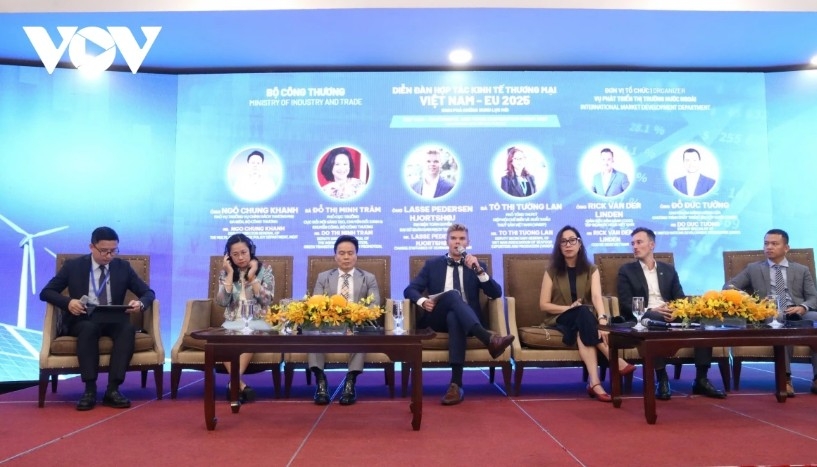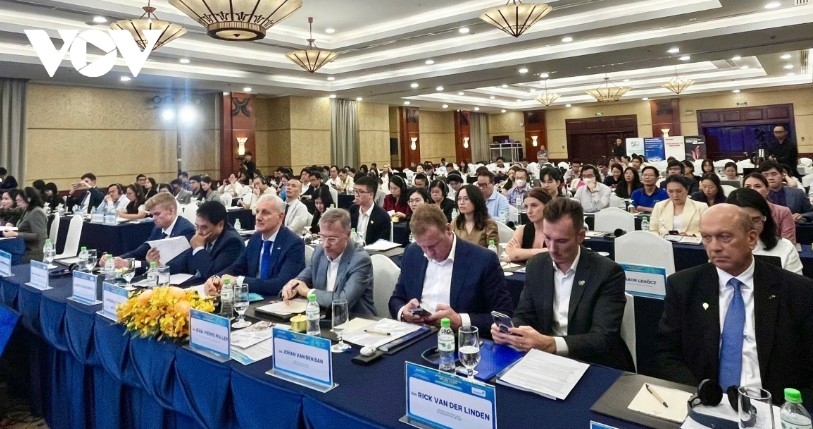Vietnamese businesses urged to push export diversification with strategic focus
VOV.VN - The Vietnam-EU Trade and Economic Cooperation Forum 2025, hosted by the Ministry of Industry and Trade (MoIT) recently in Ho Chi Minh City, centered on promoting sustainable export development as the EU-Vietnam Free Trade Agreement (EVFTA) marks its fifth year of implementation.

Untapped potential from the EVFTA
Deputy Minister Phan Thi Thang said that after five years of the EVFTA enforcement, bilateral trade between Vietnam and the EU has continued to rise, from US$48.9 billion in the first year to nearly US$78 billion in the fifth year, with an average annual growth rate of over 10%.
Vietnam’s exports to the EU increased by 11.7%, led by agricultural products. Pepper exports grew more than 3.6 times, coffee 3.2 times, and rice and fruit 2.4 times compared with the pre-EVFTA period.
According to Thang, the EVFTA has not only expanded trade but also supported economic restructuring, institutional reform, and improvement of the business and investment environment, while enhancing cooperation with EU partners in digital economy, green economy, energy transition, and sustainable development.
Ngo Chung Khanh, Deputy Director General of the Department of Multilateral Trade Policy under the MoIT, described the past five years as a “golden period” for Vietnamese enterprises to leverage the EVFTA to boost exports to the EU. However, he noted that most opportunities have been exploited only in key markets such as Germany, France, and the Netherlands, while potential in other EU countries remains largely untapped.
“The EU is a US$2.64 trillion market with many products enjoying zero tariffs under the agreement. Without the EVFTA, some items would face tariffs of 15-20%, and certain seafood products 13%. Yet our seafood exports to this US$31 billion market are just around US$1 billion,” he said.
Khanh emphasized that Vietnamese businesses should diversify their markets within the EU, while maintaining clear focus and priorities, particularly on sectors with competitive advantages and strong compliance with green standards.

Financing challenges for green production
To meet the EU’s requirements for green production and clean energy, small and medium-sized enterprises in Vietnam continue to face capital constraints.
Do Duc Tuong, energy expert at the United Nations Development Programme (UNDP), said: “We assist in developing screening processes for projects that meet just energy transition criteria and help connect them with financial institutions. Many organizations, including AFD, KfW, ADB, and the European Development Bank, have shown keen interest in financing green projects in Vietnam.”
Growing opportunities for farm produce
European companies have shown increasing interest in Vietnam’s agricultural sector. Johan Van den Ban, Managing Director of De Heus Vietnam and Asia, said the company has built a sustainability strategy focused on community responsibility and a closed-loop supply chain from raw materials to final products.
De Heus aims to help Vietnamese agricultural products meet the needs of 100 million domestic consumers, reduce import dependence, and supply food for global markets. No enterprise can achieve this transition alone, he said, stressing that it requires synchronized government policies to establish a global supply chain.
To Thi Tuong Lan, Deputy Secretary General of the Vietnam Association of Seafood Exporters and Producers (VASEP), emphasized that sustainable development is now a prerequisite for exports to the EU, though small and medium-sized enterprises still face major limitations.
She proposed stronger cooperation mechanisms: “In this sustainability journey, we cannot go alone. The government should maintain regular dialogues with the EU to build concrete roadmaps for each industry. As competition intensifies, those who lead the green transition will gain the upper hand in the market.”



